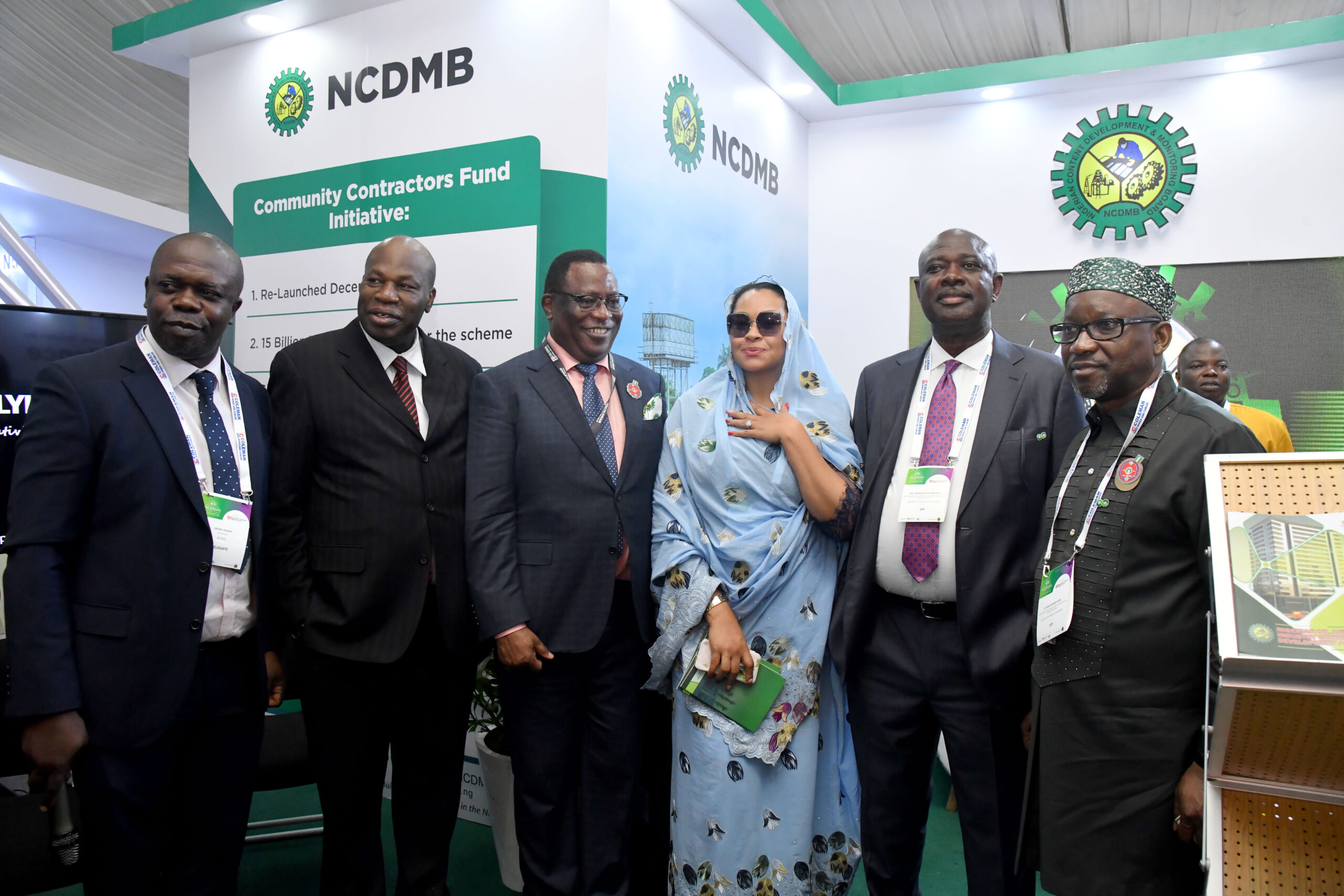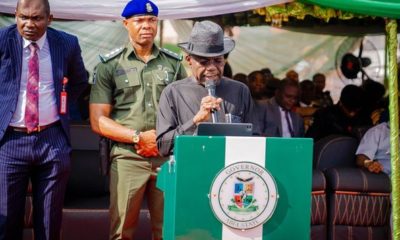NEWS
Stakeholders Hail NCDMB As Local Content Level Hits 56%

The Nigerian Content performance level in the oil and gas industry has hit 56 percent in 2024, the Executive Secretary, Nigerian Content Development and Monitoring Board (NCDMB), Engr. Felix Omatsola Ogbe announced on Tuesday.
He made the revelation at the 13th Practical Nigerian Content (PNC) Conference and Exhibition holding at the NCDMB Conference Centre, Yenagoa, Bayelsa State.
The event was graced by top government officials including the Deputy Governor of Bayelsa State, Senator Lawrence Ewhrudjakpo, Minister of State for Petroleum Resources (Oil), Senator Heineken Lokpobiri and the Minister of State for Petroleum Resources (Gas), Rt. Hon. Ekperikpe Ekpo.
ALSO READ: Dangote Cement Lights Up Benue Host Communities With CSR Initiatives
Other industry leaders in attendance included the Chairperson, Senate Committee on Local Content, Senator Natasha Akpoti-Uduaghan, chairperson, House of Representatives Committee on Nigerian Content Development and Monitoring, Hon. Boma Goodhead, the Secretary General of the African Petroleum Producers Organisation (APPO), Dr. Umar Farouk Ibrahim and chief executives of international and indigenous oil and gas companies and operating and regulatory agencies in the petroleum sector.
The Nigerian Content performance level is calculated on year-on-year basis by the Monitoring and Evaluation Directorate of the NCDMB and is anchored on the ongoing projects in the upstream, midstream and downstream segments of the oil and gas industry.
Data is aggregated from total amounts expended on projects and the Nigerian Content component of the annual spend. The data is mined from statutory reports submitted by companies and the integrity those data is verified during Nigerian Content performance reviews and workshops and they must sync with the Nigerian Content Compliance Certificates (NCCC) on projects approved by the Board.
The Nigerian Content level stood at 54 percent as at December 2022 and 2023, increasing significantly from 26 percent in 2016 before the introduction of the Nigerian Content 10-year strategic roadmap. The latest increase marks a significant milestone in the Board’s march toward 70 percent Nigerian Content by 2027 as set out in its 10-Year Strategic Road Map (2017-2027).
The NCDMB boss also revealed that 312 Nigerian Content Plans have thus far been approved by the Board and that 402 Nigerian Content Compliance Certificates (NCCCs) were issued. Also, that the new Project Certification and Authorisation Directorate (PCAD) guidelines has reduced the Board’s touchpoints from nine to five, and the contracting cycle cut to six months, he confirmed.
Engr. Ogbe and a representative of the Bank of Industry (BoI) used the PNC Forum to sign an agreement on the Revised Nigerian Content Community Contractors Financing Scheme. The Fund addresses a critical challenge faced by local contractors in accessing much-needed funds for contracts awarded by oil and gas companies.
Under the new product paper for the fund, N15 billion has been earmarked for the fund and “the single obligor limit has been increased from N20 million to N100 million,” Ogbe hinted.
On the Nigerian Content Academy recently established by the Board for training to prepare Nigerians through a range of courses that cover every aspect of the oil and gas industry, from upstream exploration to downstream processing, he said new career paths and economic opportunities are being opened for local communities. The Academy was unveiled by the Ministers as part of activities marking the Forum.
The Executive Secretary gave insight into the Back-to-the-Creeks Initiative which focuses on taking Nigerian Content benefits to local communities, especially developing basic educational facilities in communities and equipping youths in host communities with the skills needed to meet industry demands, and thus directly supporting the local content drive.
In his address, the Minister of State for Petroleum Resources (Gas), Rt. Hon. Ekperikpe Ekpo, commended NCDMB for systematically aligning its local content policy initiatives with Federal Government’s gas development agenda.
The Minister listed the NCDMB’s support for compressed natural gas (CNG) projects, modular gas processing plants, manufacturing plants for liquefied petroleum gas (LPG) cylinders, LPG depots, LPG terminals, LPG storage and bottling plants, gas gathering facilities, smart gas and detector alarm services, as critically important areas where the Board’s strategic intervention has made huge gains for the country.
He disclosed that “in the last 12 months, two critical gas projects were completed,” namely, SEPLAT Assa North and Shell Petroleum Development Company (SPDC) Ohaji South, with a combined capacity of 600 million standard cubic feet/day. Also, the 300 MMscfd Kwale Gas Gathering (KGG) Hub and Injection Facility, jointly executed by Xenergy Limited and the NCDMB, were commissioned within the same period.
While reiterating that “gas will be the mainstay of Nigeria’s energy shift” as the world transits to renewables, he stated that Government is “giving local businesses a chance to engage in gas distribution, processing, and power generation.”
With specific reference to the PNC Forum, he said the theme “Defining the Next Frontier for Nigerian Content Implementation” is “a call to action and a reaffirmation of Nigeria’s commitment to leveraging our local capabilities to drive energy security, economic growth, and environment sustainability.”
He charged the organisers of the Forum, namely, NCDMB and DMG Events Limited, to ensure that the event functions as “a spur for practical ideas that move our country closer to a promising and sustainable energy future.”
Also speaking at the event, Minister of State for Petroleum Resources (Oil), Senator Heineken Lokpobiri, commended the NCDMB for organising the Forum and for significant milestones recorded thus far since its establishment in 2010.
He revealed that wherever he has been across Africa for oil and gas-related events, other countries want to come to Nigeria to learn from its local content success story.
On divestments by international oil and gas companies (IOCs) in the country, he said there is no reason to be alarmed as indigenous operating companies have adequately filled the gaps and thus significantly increased the country’s stake in the industry.
He said that the affected IOCs have not left the country but simply moved their investments and operations from onshore to deep offshore.
The Minister urged industry players to be strategic in their thinking, noting that “quality, standards and capacity developed have to be sustained” if the country is to be able to sustain the gains made so far.
With regard to strategies to deal with the decline in funding of oil and gas projects in Africa, in the wake of the global de-emphasis of fossil fuels, the Secretary General of the African Petroleum Producers Organisation (APPO), Dr. Umar Farouk Ibrahim, said the Africa Energy Bank (AEB) would be taking off in the second quarter of 2025, with the signing and ratification of the Establishment Agreement by the required number of countries.
Its headquarters is to be located in Abuja.
In his remarks, the Bayelsa State Deputy Governor, Senator Lawrence Ewhrudjakpo, commended the NCDMB and industry stakeholders for putting together the event, and for the collaboration that has yielded remarkable developments in the petroleum industry.
He, however, reminded the industry captains that Bayelsa State accounts for about 60 percent of the gas feedstock for the Nigeria Liquefied Natural Gas (NLNG) Project, Bonny, which has now progressed to Train 7, and thus deserves to have a train built within its territory.
In the Organiser’s Welcome Address, Wemimo Oyelana, Country Director (Nigeria) and Portfolio Director (Africa), DMG Nigeria Limited, said the theme of the Forum was “designed to spark forward-looking and transformative discussions,” and that “As the Nigerian energy sector continues to evolve, it is critical to address the next steps in advancing Nigerian Content.”
Other speakers included the Chairperson, Senate Committee on Local Content, Senator Natasha Akpoti-Uduaghan, her counterpart in the House of Representatives, Hon. Boma Goodhead, the Minister of Power, Adebayo Adelabu, the Group Chief Executive Officer of Nigerian National Petroleum Company Limited (NNPCL), Mele Kyari, Chief Executive Officer of the Nigerian Upstream Petroleum Regulatory Commission (NUPRC), Engr. Gbenga Komolafe, and his Nigerian Midstream and Downstream Petroleum Regulatory Authority (NMDPRA), Engr Farouk Ahmed.
The PNC continues on Wednesday at the Nigerian Content Tower, Yenagoa and ends on Thursday with a visit to First Marine and Engineering Services Limited base in Swali, Yenagoa.
NEWS
Why NDLEA Wants Drug Tests For Corps Members, Couples
The National Drug Law Enforcement Agency (NDLEA) is intensifying its campaign against substance abuse by proposing mandatory drug integrity tests for National Youth Service Corps (NYSC) members and individuals preparing for marriage.
Chairman and Chief Executive Officer of the NDLEA, Brigadier General Mohamed Buba Marwa (Rtd), explained the rationale behind the proposal during a meeting with the NYSC leadership in Abuja on April 23, 2025.
Speaking to NYSC Director-General, Brigadier General Olakunle Nafiu, Marwa clarified that the tests are not intended to be punitive but are part of a broader strategy to curb drug abuse and intervene early in cases of dependence.
READ ALSO: NYSC Pulls Out Corps Members From Benue Community
“It is always better to detect drug use early before it gets to addiction, which eventually could get to psychiatric problems, and it becomes a danger to the user and society,” Marwa stated.
While welcoming the new NYSC chief, Marwa commended the scheme as “a national treasure and a veritable instrument of national unity.”
He highlighted the alarming rate of drug use in the country and called for collective efforts in tackling the challenge.
“The drug scourge has continued to devastate our kids, families, and communities everywhere. There’s nowhere you go in the country that you don’t have a drug abuse problem,” he said. “One in seven Nigerians between the ages of 15 and 64 uses drugs.”
Marwa emphasized that while NDLEA is working hard to restrict access and availability of drugs, reducing demand is equally important.
He urged NYSC to play a more active role in this regard.
“You have mentioned our efforts to cut off access and availability of these drugs but beyond that, we have to work with all stakeholders, including NYSC to ensure drastic reduction in the demand for drugs by our youths, and one of our strategies to address this is through our drug integrity test, which we’re advocating that NYSC should embrace for corps members.”
He also praised the introduction of the War Against Drug Abuse (WADA) clubs in NYSC camps, describing them as a positive development, while calling for further collaboration in areas such as prevention, counseling, and rehabilitation.
“This is a major drug demand reduction effort. In the same way we said, if you are getting married, both the bride and the groom should bring a drug-free certificate,” he added.
According to Marwa, early detection remains key to managing substance abuse and preventing it from evolving into more severe health or social issues.
International News
Panic In Istanbul As 6.2-Magnitude Earthquake Hits Marmara Sea
Residents of Istanbul were jolted by a 6.2-magnitude earthquake on Wednesday, which struck the Marmara Sea near the city’s western fringes, prompting widespread concern but causing no immediate casualties.
The quake, which occurred at 12:49 p.m. local time (0949 GMT), originated in Silivri, according to Interior Minister Ali Yerlikaya.
“An earthquake of 6.2 magnitude occurred in Silivri, Marmara Sea, Istanbul,” he confirmed on X, formerly Twitter. Yerlikaya also noted that tremors were felt in nearby provinces.
READ ALSO: Massive 7.7 Magnitude Earthquake Rocks Myanmar, Shakes Southeast Asia
Following the initial tremor, Turkey’s disaster management authority, AFAD, reported three more earthquakes ranging from 4.4 to 4.9 in magnitude.
The seismic activity sent people fleeing onto the streets, with many seen anxiously checking their phones or making calls.
“I just felt earthquake, I’ve got to get out,” said a decorator who dashed out of a fourth-floor apartment near Galata Tower. He declined to give his name, visibly shaken by the experience.
Despite the intensity, there were no reports of injuries or building collapses in the city of approximately 16 million people.
“Until now, we have no information about any buildings collapsing,” the governor’s office stated, urging residents to avoid entering structures that may have sustained damage.
Reassuring citizens, the Istanbul municipality also confirmed, “No serious cases have been reported so far following the earthquake in Istanbul,” in a post on X.
Tremors from the quake were reportedly felt as far as Sofia, Bulgaria, according to AFP journalists in the capital.
Authorities continue to monitor the situation as aftershocks persist and damage assessments are conducted across the region.
NEWS
We Need Help, Not A State Of Emergency In Benue – Gov Alia Tells FG
As violent attacks and killings continue to plague parts of Benue State, Governor Hyacinth Alia has ruled out the need for a state of emergency, insisting instead on immediate and absolute support from the Federal Government to combat the crisis.
Speaking during an interview on Arise Television’s The Morning Show on Wednesday, Governor Alia said the security situation, though dire, is not beyond the capacity of his administration to manage.
However, he emphasized that increased federal assistance is crucial to fully restoring peace to the troubled state.
READ MORE: No Safety Guarantee For Unscheduled Visitors To Benue – Gov Alia
“What we need is emergency help for now. We need absolute support,” the governor stated. “The federal government is supporting — they sent two armoured tanks that came in. Our situation had changed. We had a better narrative, but what we need to do is to get our people back home, to drive out the invaders… Calling for any emergency does not occur here.”
Alia blamed the persistent violence on armed herders, many of whom he claims are non-Nigerians. According to him, the assailants have displaced local farmers and occupied ancestral lands, creating a humanitarian and security crisis that needs urgent attention.
The governor also pointed to progress made under his administration, noting a reduction in the number of local government areas under attack from 17 to just six.
“We couldn’t have trimmed it from 17 local governments in the front lines of the attacks to nine and then now to six, which means we have the capability to do this — but we need help. And that is a fact,” he said.
Governor Alia reaffirmed his commitment to protecting the people of Benue and restoring displaced communities, but stressed that federal collaboration remains vital to achieving lasting peace in the state.


















